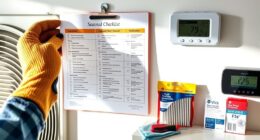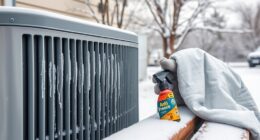We understand your skepticism: can heat pump efficiency really lead to lower electric bills? It may seem unbelievable, but we assure you, it’s achievable.
In this ultimate guide, we’ll show you how to maximize your heat pump’s energy efficiency and keep those electric bills in check.
From understanding efficiency ratings to simple maintenance tips, we’ve got you covered.
Get ready to save money and enjoy the freedom of a highly efficient heat pump.

Key Takeaways
- SEER and HSPF ratings indicate the cooling and heating efficiency of a heat pump and higher ratings indicate better energy-saving technology.
- Proper sizing, location, insulation, and sealing of the heat pump are crucial factors that impact its energy efficiency.
- Regular maintenance, including cleaning or replacing air filters and inspecting the outdoor unit, is important for optimizing heat pump performance and reducing energy consumption.
- Installing a programmable thermostat, using ceiling fans, and considering solar panels can all contribute to lowering electric bills with a highly efficient heat pump.
Understanding Heat Pump Efficiency Ratings
We will explain the key factors that determine the efficiency ratings of heat pumps.
Heat pump performance is crucial in determining how well a heat pump can convert energy into heat or cool air. Two main factors impact heat pump performance: the Seasonal Energy Efficiency Ratio (SEER) and the Heating Seasonal Performance Factor (HSPF).
SEER measures the cooling efficiency of a heat pump, while HSPF measures its heating efficiency. Higher SEER and HSPF ratings indicate better energy-saving technology and lower energy consumption.
Additionally, factors such as insulation, ductwork, and proper installation play a significant role in heat pump efficiency.
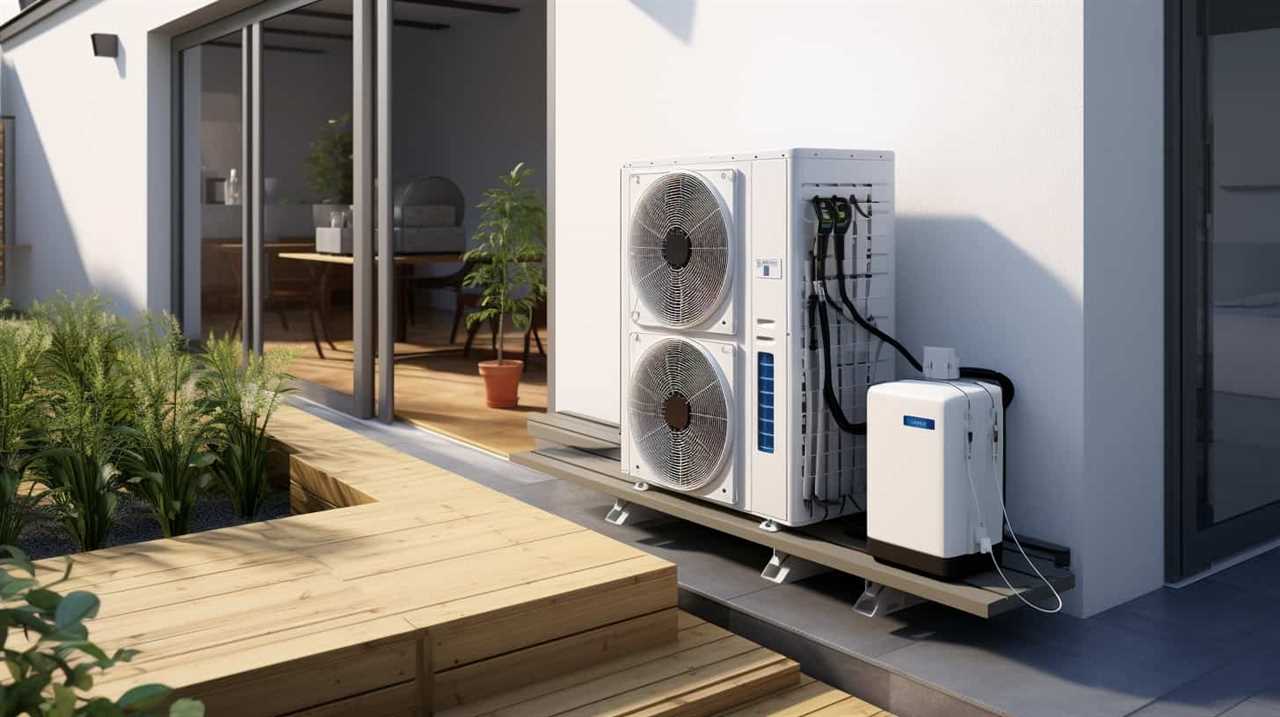
When considering a heat pump, it’s essential to focus on its performance ratings to ensure maximum energy efficiency and lower electric bills.
Factors Affecting Heat Pump Energy Efficiency
To understand heat pump energy efficiency, we need to examine the various factors that can affect its performance. Here are three key factors that can impact the efficiency of a heat pump:
-
Heat Pump Sizing: Properly sizing a heat pump is crucial for optimal energy efficiency. If the heat pump is too small for the space it’s trying to heat or cool, it will have to work harder and consume more energy to meet the desired temperature. On the other hand, if the heat pump is oversized, it may cycle on and off frequently, leading to reduced efficiency.
-
Heat Pump Location: The location of the heat pump can also affect its energy efficiency. For example, if the heat pump is placed in an area that receives direct sunlight or is exposed to high winds, it may have to work harder to maintain the desired temperature, resulting in higher energy consumption.

-
Insulation and Air Leakage: The insulation of the home and the presence of air leaks can impact the energy efficiency of a heat pump. Good insulation helps to minimize heat transfer, reducing the workload on the heat pump. Similarly, sealing air leaks in the home ensures that the heated or cooled air stays inside, allowing the heat pump to operate more efficiently.
Tips for Improving Heat Pump Efficiency
Here are five simple tips to improve heat pump efficiency and save on electricity costs.
First, make sure your heat pump is properly sized for your home to maximize its performance. A unit that’s too small will have to work harder, while an oversized one will cycle on and off frequently, wasting energy.
Second, keep your filters clean and replace them regularly. Dirty filters restrict airflow, reducing the efficiency of your heat pump.
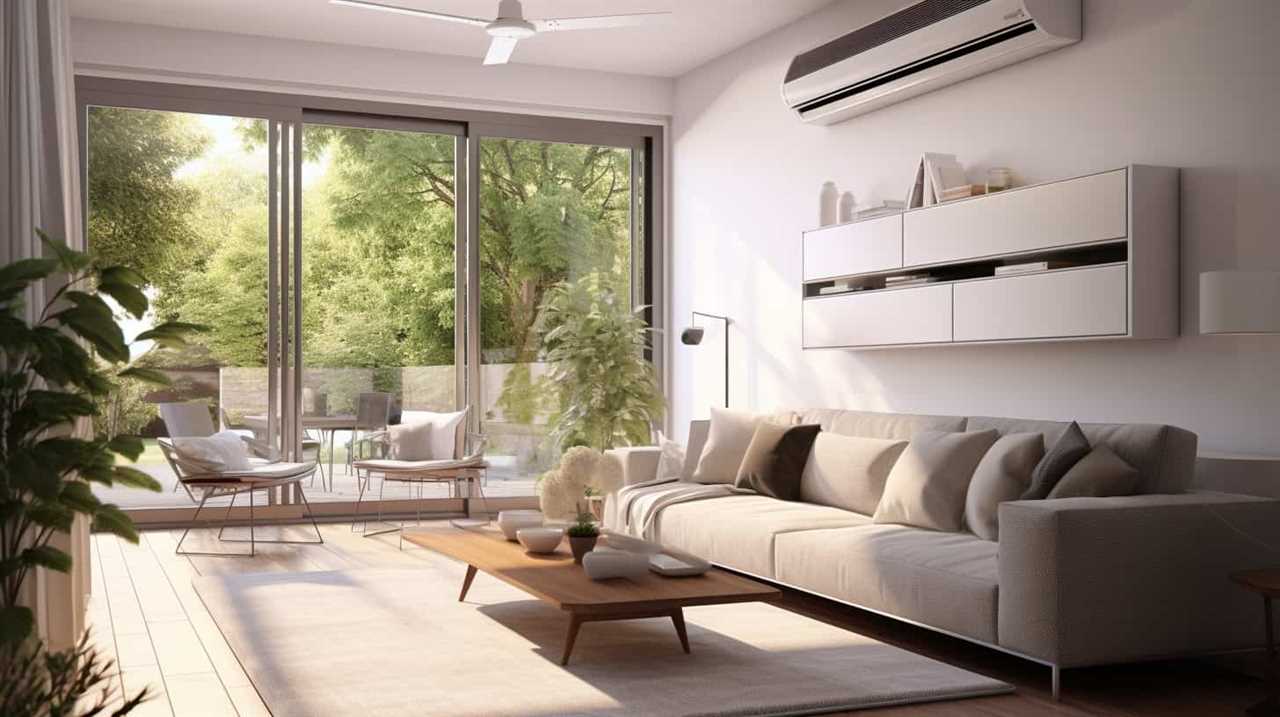
Third, maintain good airflow around your outdoor unit by keeping it clear of any obstructions such as leaves or debris.
Fourth, install a programmable thermostat to control your heat pump’s operation and optimize energy usage.
Finally, consider using ceiling fans to circulate the air, allowing you to set your thermostat a few degrees higher without sacrificing comfort.
By implementing these energy-saving techniques, you can maximize your heat pump’s performance and lower your electricity costs.
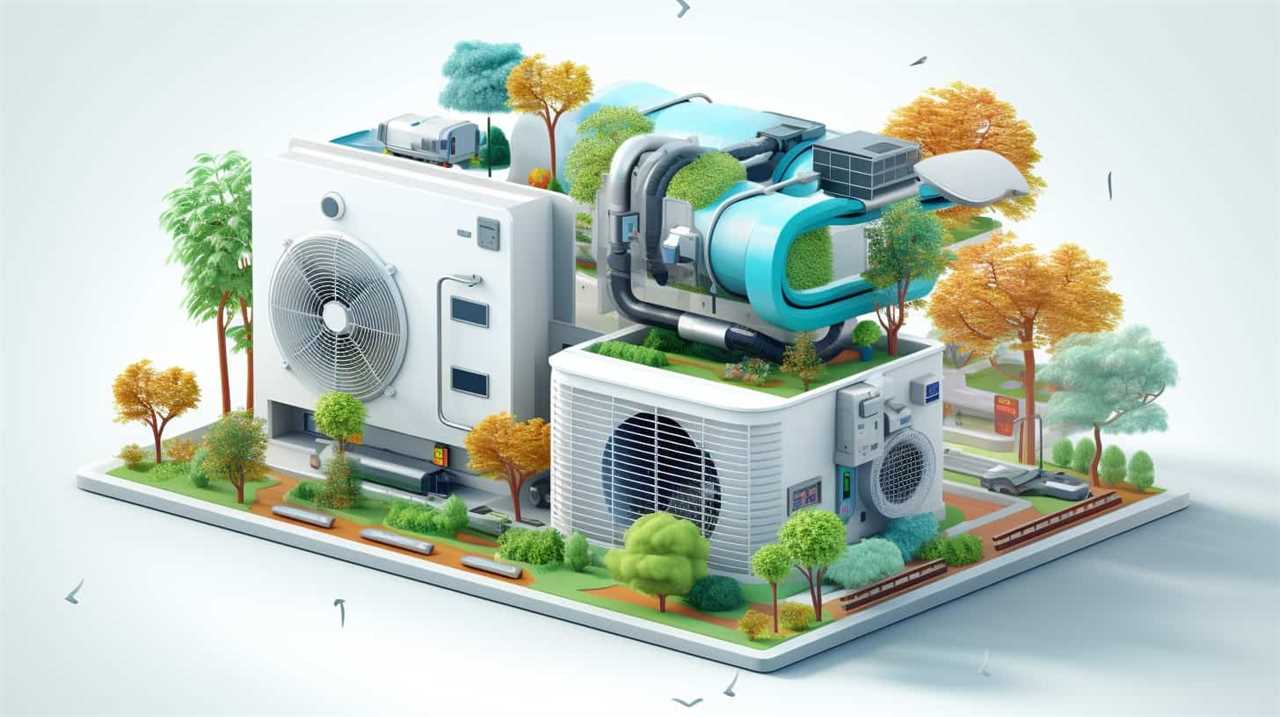
Now, let’s move on to the importance of regular maintenance for energy efficiency.
Importance of Regular Maintenance for Energy Efficiency
Regular maintenance is essential for ensuring energy efficiency in heat pumps. By performing regular maintenance on your heat pump, you can optimize its performance and reduce energy consumption, resulting in lower electric bills. Here are three energy-saving tips for cost-effective maintenance:
-
Clean or replace air filters: Clogged filters restrict airflow, causing your heat pump to work harder and consume more energy. Regularly cleaning or replacing air filters can improve energy efficiency.
-
Check and clean the outdoor unit: Debris, such as leaves and dirt, can accumulate on the outdoor unit, hindering its performance. Regularly inspect and clean the unit to ensure proper airflow and optimal heat transfer.

-
Schedule professional maintenance: Hiring a professional technician to perform routine maintenance can identify and address any issues with your heat pump, ensuring it operates efficiently and extends its lifespan.
How to Lower Electric Bills With a Highly Efficient Heat Pump
We can significantly lower our electric bills by using a highly efficient heat pump.
One way to maximize the efficiency of our heat pump is by installing a smart thermostat. A smart thermostat allows us to set customized schedules and adjust the temperature remotely, ensuring that we only use energy when needed.
Additionally, we should take advantage of energy-saving heat pump settings. For example, using the ‘energy-saving’ or ‘eco’ mode can help optimize energy consumption by adjusting the heat pump’s operation to minimize energy waste.

It’s also important to regularly clean and maintain our heat pump to ensure optimal performance.
Frequently Asked Questions
Are There Any Government Incentives or Rebates Available for Installing a Heat Pump?
Yes, there are government incentives and rebates available for installing a heat pump. These incentives and rebates can help offset the cost of installation, making it more affordable for homeowners.
How Does the Size of My Home or Building Affect the Efficiency of a Heat Pump?
The size of your home or building plays a crucial role in the efficiency of a heat pump. Larger spaces require more energy consumption and may have different insulation requirements.
Can I Use a Heat Pump in Extremely Cold Climates?
Yes, we can use heat pumps in extremely cold climates. While their performance may decrease in low temperatures, advancements in technology have improved their reliability, making them suitable for colder environments.

What Are Some Common Signs That My Heat Pump May Need Maintenance?
Regular heat pump maintenance is important. Signs of maintenance include reduced heating or cooling performance, strange noises, and higher energy bills. We should always prioritize the upkeep of our heat pump to ensure its efficiency and lower electric bills.
Are There Any Additional Steps I Can Take to Further Reduce My Electric Bills When Using a Highly Efficient Heat Pump?
Sure, there are additional steps we can take to further reduce our electric bills when using a highly efficient heat pump. We can implement further energy saving tips and optimize the heat pump’s performance.
Conclusion
In conclusion, understanding heat pump efficiency ratings and implementing tips for improving efficiency can lead to significant savings on your electric bills.
By investing in a highly efficient heat pump and regularly maintaining it, you can enjoy both comfort and cost savings.
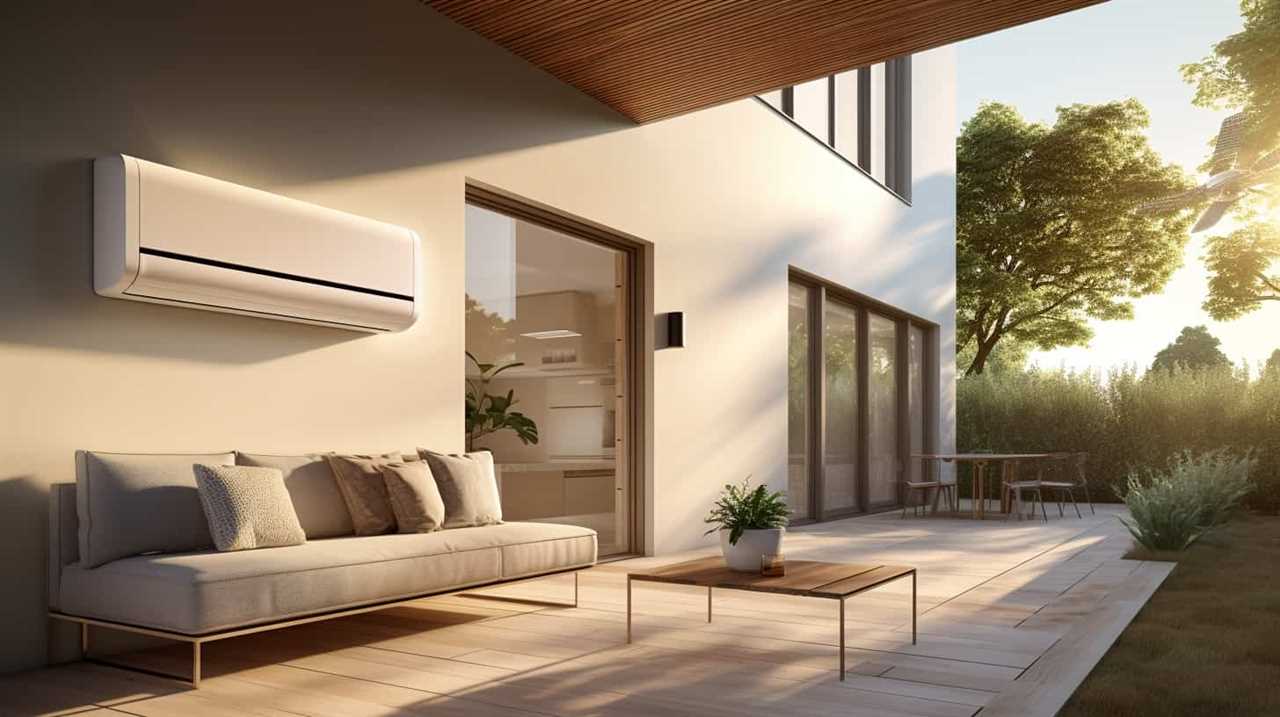
So, don’t let your energy bills skyrocket, take control of your home’s heating and cooling system and start enjoying the benefits of a more efficient heat pump today.







